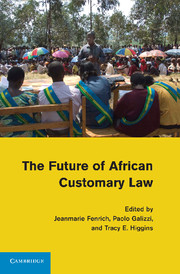Book contents
- Frontmatter
- Contents
- Notes on Contributors
- Acknowledgments
- Introduction
- Part One The Nature and Future of Customary Law
- 1 A Survey of Customary Laws in Africa in Search of Lessons for the Future
- 2 The Future of Living Customary Law in African Legal Systems in the Twenty-First Century and Beyond, with Special Reference to South Africa
- 3 The Future of Customary Law in Africa
- Part Two Ascertainment, Application, and Codification of Customary Law
- Part Three The Role and Power of Traditional Authorities
- Part Four Customary Land, Property Rights, and Succession
- Part Five Customary Criminal Law
- Part Six Customary Law, Human Rights, and Gender Equality
- Index
- References
1 - A Survey of Customary Laws in Africa in Search of Lessons for the Future
Published online by Cambridge University Press: 05 February 2012
- Frontmatter
- Contents
- Notes on Contributors
- Acknowledgments
- Introduction
- Part One The Nature and Future of Customary Law
- 1 A Survey of Customary Laws in Africa in Search of Lessons for the Future
- 2 The Future of Living Customary Law in African Legal Systems in the Twenty-First Century and Beyond, with Special Reference to South Africa
- 3 The Future of Customary Law in Africa
- Part Two Ascertainment, Application, and Codification of Customary Law
- Part Three The Role and Power of Traditional Authorities
- Part Four Customary Land, Property Rights, and Succession
- Part Five Customary Criminal Law
- Part Six Customary Law, Human Rights, and Gender Equality
- Index
- References
Summary
Introduction
The role of customary laws in the twenty-first century, whether in Africa or elsewhere, is of great theoretical interest. It is important, however, that the present discussion makes a contribution to legal development in Africa. I seek here to discern the lessons that can be learned from past experience of customary laws in Africa and that may assist in determining future policies toward customary law.
- Type
- Chapter
- Information
- The Future of African Customary Law , pp. 9 - 30Publisher: Cambridge University PressPrint publication year: 2011
References
- 11
- Cited by

